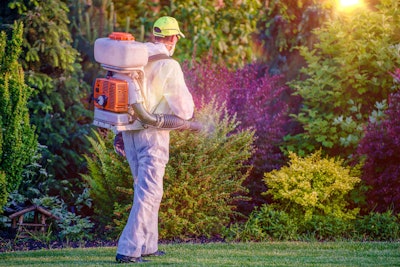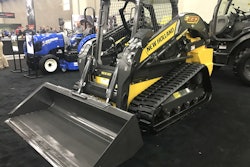
In fact, each year 1,800-3,000 preventable occupational incidents involving pesticide exposure are reported. Keeping workers safe is not just a best management practice – it is the law. The federal Worker Protection Standard (WPS) was revised in 2015 and now provides a greater focus on reducing pesticide exposures. A closed system of transferring chemicals reduces unnecessary exposures by providing controlled delivery of chemical products without fear of worker exposure, over-pouring, spilling or releasing vapors. Many of the revisions became effective this January.
“Beyond workers compensation issues related to exposure, there can be other huge potential liabilities: Environmental Protection Agency (federal) or state regulatory fines, as well as clean-up or remediation costs,” says Kerry Richards, Ph.D., president elect of the American Association of Pesticide Safety Educators and former director of Penn State’s Pesticide Safety Education Program. “This is particularly true if a pesticide gets into a water source, kills fish, or contaminates drinking water.”
According to Richards, the direct and indirect costs of a pesticide spill or injury can be substantial, not the least of which is the loss of wasted chemicals.
“Pesticides, particularly newer concentrated formulations, are very expensive so spilling a few ounces could cost you several hundred dollars in lost product during a single transfer,” says Richards.
Although a number of pump types exist for chemical transfer (rotary, siphon, lever-action, piston and electric), most are not engineered as a sealed, contained system. In addition, these pumps can have seals that leak, are known to wear out quickly, and can be difficult to operate, making precise volume control and dispensing difficult.
In contrast, closed systems can dramatically improve the safety and efficiency of chemical transfer, as well as prevent the spillage or loss of valuable chemicals or concentrated formulations.
“The availability of new technology that creates a closed or sealed system is ideal for handling pesticides or other dangerous chemicals, and should become a best management practice,” suggests Richards. “With such devices pesticide handlers can maintain a controlled containment from one vessel to another and significantly reduce any potential for exposure or spill.”
Small, versatile, hand-operated pressure pumps, such as those manufactured by GoatThroat Pumps, are engineered to work as a system which can be either closed or sealed. The pumps can be used for the safe transfer of over 1400 industrial chemicals, including the most aggressive pesticides. The pumps function essentially like a beer tap. The operator attaches the pump, presses the plunger several times to build up a low amount of internal pressure, and then dispenses the liquid. The device is configured to provide precise control over the fluid delivery, from slow (1ML/ 1 oz.) up to 4.5 gallons per minute, depending on viscosity, and are safe to use with virtually any container from 2-gallon jugs to 55-gallon drums.
Golf resort adopts “Best Practice” pump systems
Mike Cocino, assistant superintendent of Seaview Golf Resort in Galloway, New Jersey, sought a safer, more efficient way to transfer liquid fertilizers, wetting agents, biostimulants, and other plant growth regulators from 55 gallon drums to measuring containers. These would, in turn, be transferred to mix tanks ranging in size from 1 gallon hand pumps to 300 gallon sprayers.
Additionally, according to Cocino, sliding the heavy drums off of pallets with a dolly, and then tipping and pouring the drums was challenging, particularly in areas with limited storage.
“Drums can roll or fall, and you do not want to lose control of an entire drum,” says Cocino. “When tipping a drum, it’s difficult to pour out the right amount and easy to over-pour or splash some of the contents out.”
Cocino adds that getting to the needed drum typically required his staff had to move a few other drums out of the way, which was a laborious process.
To address these issues, Cocino purchased three closed system pumps and was happy with the results for a number of reasons.
“Safety is a huge priority for us, and with the sealed pumps we’re able to safely pump whatever product we need without moving or tipping any barrels,’” says Cocino. “The barrels stay safely in place, upright on their pallets, which is definitely a ‘back saver.’ Because of this, we’ve eliminated any issues of spillage or related cleanup.”
Cocino estimates that by avoiding the need to move the barrels, tip and pour product, and clean up any potential spills, his operation saves at least 50 hours of labor annually.
“The closed sealed pumps also allow my staff to safely and completely empty the contents of each barrel,” says Cocino. Previously, tipping and pouring left a significant amount of product at the bottom of each barrel because it was hard to remove.
In addition, he says that precise control of product from the pumps enables exact filling of the measuring container to desired fill lines. This provides better, more consistent results in the mix tank.
“Our golf maintenance operation is safer, cleaner, and more efficient with these pumps,” concludes Cocino. “Any golf course, lawn care, landscape, or growing operation that requires the safe transfer of liquid chemicals should look into them.”
Safe chemical handling at Lancaster Farms
When Lancaster Farms, a wholesale container plant nursery serving the Mid-Atlantic and New England regions, required a lower pH to adjust its well water for a pesticide spray application, it had to transfer sulfuric acid to buffer the spray water.
According to Shawn Jones, Lancaster Farms’ propagation and research manager, the nursery chose to purchase 55 gallon drums of sulfuric acid to raise chemical pH. The drums of chemicals were much more cost effective than multiple 2.5 gallon containers and much easier to recycle. However, Jones was wary of the danger that tipping and pouring acid from the drums would pose, along with pouring bleach and another strong disinfectants for different uses in the propagation area.
“We use 40% sulfuric acid to buffer our spray water,” says Jones. “Our irrigation water is all recycled from ponds, with the drum storage areas relatively close to our water source, so we wanted to avoid any possibility of accidental spillage.”
Previously, the nursery had used siphon pumps to transfer the acid, bleach and disinfectant, but Jones was dissatisfied with this approach. “None of our siphon pumps lasted more than six months before we had to replace them, and none allowed metering with the kind of precision we required,” he says.
Instead, Jones chose to implement several closed, sealed pumps along with graduated cylinders for precise measurement. “With the pumps, the drums always remain in an upright position so they won’t tip over accidentally,” says Jones. The one-touch flow control dispenses liquids at a controlled rate. “We get precise measurement into our mix tanks. We use every drop, spill nothing, and waste nothing.”
In terms of longevity, Jones’ first sealed pump has already lasted six years and outlasted a dozen previous siphon pumps.
“Our pumps paid for themselves in safety and savings our first growing season, and should last a decade or more with just routine maintenance or repair,” concludes Jones. “Any grower, farmer or nursery that needs to move or measure dangerous liquids safely and reliably should consider one.”
Lawn care, landscape and nursery chemicals are very expensive, and operators are always looking for ways to decrease the cost of inputs to help increase profits. Sealed systems and closed systems allow for accurate and precise measuring of chemicals, which ensures that you’re using only the amount of product required and not one extra drop.
Taking the guesswork out of measuring costly materials, and providing an efficient means of transferring custom blended or dilute products from original containers to mix tanks or backpack sprayers cuts input costs. This keeps expenses to a minimum, with the important bonus of increasing the safety of handlers by reducing the potential exposure to the chemical. This boosts the bottom line and can help with Worker Protection Standard regulatory compliance.
EDITOR’S NOTE: This article was written by Nancy Westcott, president of Westcott Distribution Inc., which manufactures hand-pressured Goat Throat™ pumps for commercial and industrial safe handling of liquids and chemicals.









